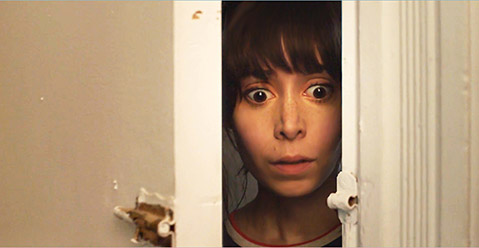‘It Had to Be You’
Director Sasha Gordon

Certain to be a festival favorite, this is a smart, inventive, expertly acted, thoroughly engaging romantic comedy about a woman who’s intimidated by the thought of marriage, despite all the stars otherwise aligning.
See www.ithadtobeyouthemovie.com.
Does this story come from any personal heartbreak? The character and you are both composers, of course.
It’s definitely a pretty personal story. When my husband proposed (or tried to), rather than seeing hearts and hearing violins, I was filled with a panic and terror reserved for climactic horror movie scenes. I yelled, waved my arms in the air, and pretty soon was unable to see or hear as adrenaline took over my body. And keep in mind this was a man I loved.
This wasn’t the first time in my life that my reaction to a major life event greatly clashed with cultural expectations or norms. It was often anxiety-provoking and confusing but thankfully it was also usually very funny, at least in retrospect. As I got a little older, I encountered a lot of women who described a similar dissonance between expectation and reality.
So when I set out to make my first feature, I knew this was a dissonance I wanted to explore, and that this particular moment in a woman’s life — the big proposal — was a good jumping off point since it’s so loaded with expectations of what it’s “supposed” to feel like.
Society does seem to think people who don’t want to marry are either from divorced parents or in some way emotionally damaged. Did you intend for your film to make people rethink that perspective?
Yes, that was absolutely my intention. I even have the character specify that in the beginning in voice over, that there’s no baggage that’s tainting her desire to settle down. In my experience the notion that women are dying to settle down and men are the ones who get cold feet/avoid commitment is simply untrue. I’ve seen the majority of my female friends wrestle with questions like “how do I know he’s the one”, “is this the right time”, “what about my career”, “is our relationship good enough”, all kinds of doubts.
Actually, very few women I know were just sitting around hoping and praying their boyfriend would propose and then jumping at the opportunity. Come to think of it, none.
And it’s been interesting to see the response to the film: women of all ages have come to me after screening saying how much they related to the character and relaying their own hilarious bumpy journeys to “I do.” I had a woman in her 70s tell me that her husband proposed to her for SEVEN YEARS before she accepted.
There’s also the perceived conflict between a woman’s career and marriage. Are you hoping to trigger thinking about that as well?
That’s definitely a theme in the film, though I find that conflict to be a bit less interesting maybe because for me it was less of an issue. I knew I’d keep working, I knew my husband would be supportive of my dreams, career, etc. I find the conflict between cultural expectations and the fantasies it cultivates in our brains and then the reality of the moment more interesting.
I’m definitely a sucker for conventional romantic comedies, magazines, fashion and other so called girly things, so that dissonance is always present in my life. I imagined what I was going to be like when I was a “proper adult” based on TV shows, magazines, and then of course the truth is so far from that. But I think fantasy is important. I even don’t mind what people refer to as “unrealistic imagery of women in magazines.” I think it’s just important to understand that that’s what they are, fantasy. Fun to look at, to daydream about, but you have to know it’s not real, and it’s certainly not very important.
How did you make the jump from musicmaking to filmmaking? What’s different and/or similar about the process?
I studied music and visual art at Brown University and when I graduated at first I decided to pursue music and I went to conservatory and started working as a composer. But then I found myself missing the visual end of things and I decided to go to film school. It seemed like film was a great medium to engage all the sense so that I could keep making music but also tell stories, create images.
Composing is a pretty solitary pursuit. You do work with the director but that’s about it, the rest of the time you’re alone doing your thing in a very controlled environment where you can achieve exactly the result you want, the result you hear in your head. Filmmaking is about as collaborative a medium as there is. There are so many people that come into play between the word on the page and the image on the screen. It’s very different. More challenging in many ways but also more exciting because you get to see your ideas come to life in ways you may have never imagined.
Where did you find the cast? They seem to be actors with bright futures ahead of them.
We had a fantastic casting director, Avy Kaufman. She cast films like Lincoln, and worked with incredible directors so we were extremely lucky to have her. She brought in Cristin and then we read different men with her and Dan was the obvious choice. They had great chemistry. Cristin was just nominated for the Critics’ Choice Award for her work on Fargo which we’re so excited about.
Should more women propose to men?
I don’t see why not. Aside from all the things I mentioned above in terms of cultural expectations, I also just hate surprises so I was never going to do well with a traditional proposal scenario. But really everyone should just do what makes them comfortable, what makes them happy.



